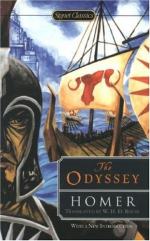“Succeed the omens, gods! (the youth rejoin’d:)
Soon shall my bounties speak a grateful mind,
And soon each envied happiness attend
The man who calls Telemachus his friend.”
Then to Peiraeus: “Thou whom time has proved
A faithful servant, by thy prince beloved!
Till we returning shall our guest demand,
Accept this charge with honour, at our hand.”
To this Peiraeus: “Joyful I obey,
Well pleased the hospitable rites to pay.
The presence of thy guest shall best reward
(If long thy stay) the absence of my lord.”
With that, their anchors he commands to weigh,
Mount the tall bark, and launch into the sea.
All with obedient haste forsake the shores,
And, placed in order, spread their equal oars.
Then from the deck the prince his sandals takes;
Poised in his hand the pointed javelin shakes.
They part; while, lessening from the hero’s
view
Swift to the town the well-row’d galley flew:
The hero trod the margin of the main,
And reach’d the mansion of his faithful swain.
BOOK XVI.
Argument.
The discovery of Ulysses to telemachus.
Telemachus arriving at the lodge of Eumaeus, sends him to carry Penelope the news of his return. Minerva appearing to Ulysses, commands him to discover himself to his son. The princes, who had lain in ambush to intercept Telemachus in his way, their project being defeated, return to Ithaca.
Soon as the morning blush’d along the plains,
Ulysses, and the monarch of the swains,
Awake the sleeping fires, their meals prepare,
And forth to pasture send the bristly care.
The prince’s near approach the dogs descry,
And fawning round his feet confess their joy.
Their gentle blandishment the king survey’d,
Heard his resounding step, and instant said:
“Some well-known friend, Eumaeus, bends this
way;
His steps I hear; the dogs familiar play.”
While yet he spoke, the prince advancing drew
Nigh to the lodge, and now appear’d in view.
Transported from his seat Eumaeus sprung,
Dropp’d the full bowl, and round his bosom hung;
Kissing his cheek, his hand, while from his eye
The tears rain’d copious in a shower of joy,
As some fond sire who ten long winters grieves,
From foreign climes an only son receives
(Child of his age), with strong paternal joy,
Forward he springs, and clasps the favourite boy:
So round the youth his arms Eumaeus spread,
As if the grave had given him from the dead.
“And is it thou? my ever-dear delight!
Oh, art thou come to bless my longing sight?
Never, I never hoped to view this day,
When o’er the waves you plough’d the desperate
way.
Enter, my child! Beyond my hopes restored,
Oh give these eyes to feast upon their lord.
Enter, oh seldom seen! for lawless powers
Too much detain thee from these sylvan bowers,”
The prince replied: “Eumaeus, I obey;
To seek thee, friend, I hither took my way.
But say, if in the court the queen reside
Severely chaste, or if commenced a bride?”




